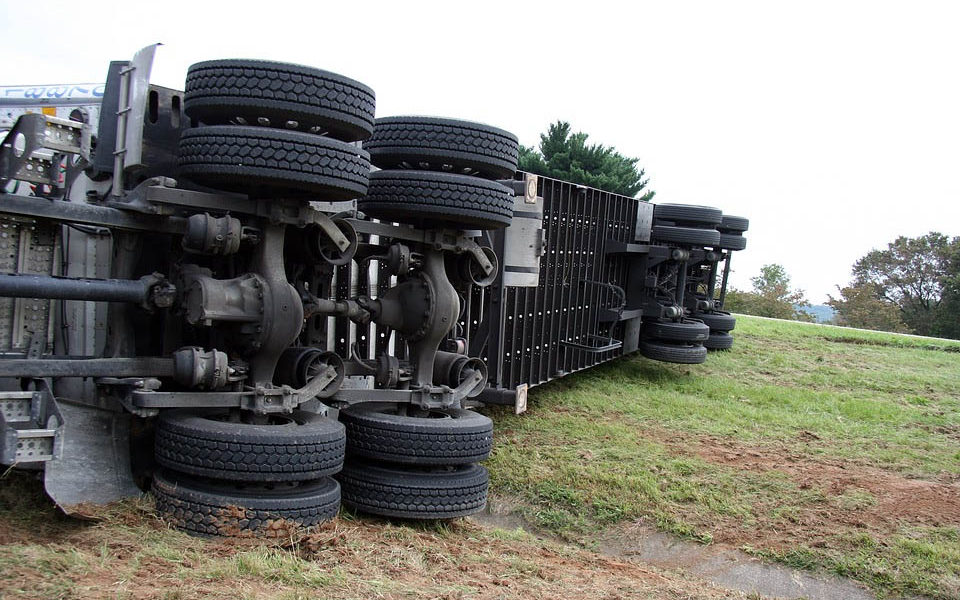Besides rain, snow, and fog, there’s another weather-related hazard for truck drivers: strong winds. Semi trucks, in particular, are at an immense risk of tipping over during a windy condition on an open road. But when they do tip over and crash, causing injury to the trucker and other motorists, who or which is at fault? Can the truck driver recover compensation for their injury, lost wages, and other damages?
The Case of an Improper Load
Semi trucks are designed to have a tractor unit and one or more semi-trailers to carry freight. Because of their design, semi trucks have to adhere to strict load weight requirements. When the cargo is not secured properly or is too light, its contents will likely shift while the truck is on the road. Any sudden change in weight distribution can greatly impact the way a semi truck driver navigates a turn or move through high winds.
An empty trailer can also cause a semi truck to tip over if strong winds blow it. As such, local wind restrictions prohibit drivers of trucks with empty trailers from using certain roads and bridges. Areas with frequent strong winds are also often marked with warning signs to prevent tractor-trailer accidents.
If the truck’s trailer is empty or full but improperly loaded, the driver or team responsible for loading the truck can be found liable for any injuries resulting from a semi truck tipping over due to strong winds. Some laws oblige semi-truck drivers to operate safely, and this includes safe and proper load management.
The Problem with Poor Route Planning
Professional truckers must plan for weather conditions. They should always be on the lookout for any impending snow or rain and possible high wind speeds. It is vital for them to check the weather forecast for their route and destination before getting on the road.
When the forecast says the wind gust will be above 50mph along the trucker’s planned route, it is imperative for the driver and the company to look for an alternate route. Failure to do so can put both the trucker and the company at risk of liability for a truck rollover accident during high winds.
The Ill-Advised Decision
There are times when the weather forecast about strong winds comes after the trucker has already hit the road. Heavy wind gusts are observable. Truckers will likely notice the wind pressure on their trailer. In such situations, they must stop and call the motor carrier’s dispatcher to express their concerns.
The dispatcher should help the trucker find an alternative route, look for safe parking for a stopover, or adjust the shipping schedule. In some cases, however, the dispatcher advises — and even pressures — the trucker to keep on driving despite dangerous wind speeds to meet the schedule or avoid any operational losses. If such instructions led to a semi-truck rollover, the company might be held liable.
Other Possible Culprits
It can be difficult to determine who is at fault for semi truck accidents when strong winds are involved. Apart from the factors discussed above, it largely depends on the details of the case, including:
- Mechanical problems that contributed to the wind-related accident
- Distracted or inattentive driving that led to the driver losing control in windy conditions
- Road conditions, and whether the truck was driving too fast for such conditions
- Whether the wind was solely to blame as the driver exercised common sense and good judgment during the time of the accident
No matter who or what is at fault, it is hazardous for a semi truck to topple over. It may fall on a passenger car or crash into other vehicles, causing severe injuries to the trucker and other motorists. The accident can also tie up traffic for hours or even force a major interstate highway to be closed, affecting the supply chain and daily operations of many other businesses.
When Injuries Occur
Following a semi truck accident due to strong winds, injury victims, including the driver, may have the right to seek compensation from the operator or motor carrier of the semi truck involved.
If employed, the driver may recover damages under the worker’s compensation policy. The worker’s comp may cover all reasonable medical expenses related to injury treatment.
On the other hand, some trucking companies use the Occupational Accident Policies to provide benefits to their truckers who are not employees. If you’ve been hired as an owner-operator and sustained injuries in a wind-related road accident, you may seek compensation through the occupational accident insurance.
Seeking compensation for a work-related trucking injury, however, is no easy feat. Many trucking companies would dodge their responsibilities to pay damages. Some would even resort to twisting the story, putting all the blame on the trucker. In such situations, you’ll need the help of an experienced lawyer.
Strong Legal Representation for Truck Drivers in Washington
At Truck Driver Rights, we have trucking lawyers who have years of experience protecting the rights of truckers under Washington law. Our firm is led by Attorney Joshua Haffner, who is knowledgeable about the landscape of the trucking industry in the state and legal developments surrounding it.
If you were pressured to drive an empty or improperly loaded semi-truck under dangerous weather conditions such as strong winds, sustained injuries as a result, and failed to get just compensation, our attorneys are here to represent your case in court.
Our firm works on a contingency basis; if we don’t win, we won’t charge you. Count on our firm to evaluate the details of your case thoroughly, build your claim, and represent you strongly in court.
Again, it can be difficult to determine fault and who is liable for wind-related semi-truck accidents. But when you hire our firm, we can get our entire team working for your case. We will work to establish fault and help you obtain the compensation you deserve.
Get in touch with our law firm today for a free consultation.

